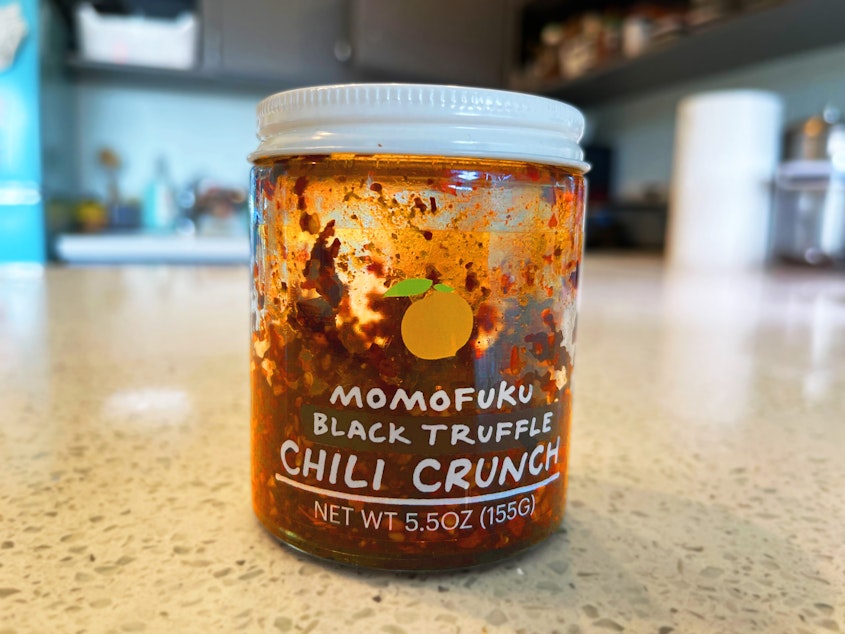Who gets to own the beloved ‘chili crunch’ condiment? A foodie fight is heating up

Chili crunch is known for its punch, and now, a legal battle over the name has one Seattle foodie fighting back against a culinary giant.
Celebrity chef David Chang’s company Momofuku has issued cease-and-desist letters to numerous smaller companies for using "chili crunch" to describe their own products — including at least one company in Seattle.
RELATED: 7 Washington culinary hotshots are still in the running for a 2024 James Beard Award
Momofuku currently holds the trademark for "chile crunch" — with an "e" instead of an "i" at the end — but the company is seeking to expand their ownership of the name rights by filing for trademark ownership of "chili crunch."
Seattle-based food journalist and cookbook author Kat Lieu told Soundside's Libby Denkmann she's willing to risk turning up the heat to make her point, basically, that Chang's claim to "chili crunch" is "silly."
Sponsored
"Imagine someone goes and tries to trademark something like American ketchup or American mayonnaise or Japanese soy sauce. It's that silly," Lieu said.
Soon after the news of Chang's cease-and-desist notices went public, Lieu made her own recipe for chili crisp with a local spice company.
"I was so enraged," Lieu said of her decision to make her own chili crisp mix "overnight."
"We wanted to be very cheeky. ... But we don't have six figures to fight a lawsuit if they go after us, and they legally can go after us if they wanted to."
RELATED: How to make dumplings: Easy folding techniques from a Seattle chef
Sponsored
In Lieu's eyes, Chang's behavior is a classic "trademark bully" behavior, but equally to blame for this situation is the United States Patent and Trademark Office, or USPTO. Lieu argued USPTO never should have granted the "chile crunch" trademark to Momofuku in the first place, Lieu argued.
"It's kind of their fault for allowing this to happen," Lieu said. "In order to protect his trademark, [Chang] has to do all this villainous [behavior] and bullying, of sending out the cease-and-desist and also suing little companies [to keep the trademark]."
Chang's cease-and-desist letters may have garnered him some enemies in the chili crunch creator community, but the move is within his legal purview, said Christopher Sprigman, an intellectual property law professor at New York University.
"I don't think David Chang [has done] anything legally wrong at all, although I think his trademark claims might be a bit overreaching," Sprigman said. "I think the question really is whether anyone should purport to own something as general as the term 'chili crisp' or 'chili crunch.'"
RELATED: Exploring the meaning of community in Seattle's Chinatown-International District
Sponsored
If Momofuku is granted the trademark to "chili crunch" by the USPTO, Sprigman said there could be serious "competitive consequences" for other businesses and consumers in general.
"When you grant these trademarks, they have competitive consequences," he said. "It becomes more difficult for people to tell consumers what their products are. If they can't use these very common terms that are used traditionally by people cooking or eating in this genre, that deprives all of us of information about what products are. And that's a real cost."
Smaller companies that received a cease-and-desist letter from Momofuku can choose to dig in and fight. But that has a cost, too — a big one.
"The sad story is, for these small companies to hang in there, they've got to be prepared to spend money, they've got to be prepared to fight, and they have to be prepared for the possibility of losing," Sprigman said.
Sponsored
RELATED: What we lose when restaurants close
Lieu admitted that she doesn't have the cash if Momofuku decides to go after her for her chili crunch kit. But she said she believes in standing up for her fellow business owners and chili-crunch creators anyway.
"This is a sauce that's existed for centuries. It's for everyone to enjoy and anyone should be able to market it, write about it, and profit from it — not just a sole company," Lieu said. "Is it cool? Is it kosher? Absolutely not."





